It’s now some five-and-a-half years since this production was first given at Covent Garden, and – pace the house’s incorrect press notes – this is its first revival, not second. That occasion in 2010 was in large part a write-off, theatrically inconsequential when not actively incompetent, and was only (just about) salvaged as an experience by the musical skills of the cast, including Johan Botha in the title role, Eva Maria Westbroek as Eva and, above all, Christian Gerhaher as Wolfram, under the weighty-when-not-positively-leaden direction of Semyon Bychkov (this performance, of the identical musical text – Vienna 1875 revision – shears 26’, no less, off the previous running time). Now the wretched thing, so bad and irrelevant as a staging it of course won awards, returns with what little scenic interest it ever had carefully removed – all the rather striking ups and downs in Act I of whole tracts of the stage floor, with the tree marooned on a raised block in the middle of yawning space, all gone – and its once carefully delineated-with-light vast empty spaces now just reduced to functionally-lit small areas with singers on. So the staging, far from improving, is now visibly worse, ignoring Wagner’s rather muddled disquisition on the nature of the artist’s unique place in society as somehow morally exempt, and vigorously eschewing the murky quasi-Christianity of the principal plotting concerning the possibility of redemption through forgiveness and understanding. Instead it’s all Kalashnikovs in a bombed-out opera house, in which it would be too much to hope that the director, Tim Albery, had been present when it happened, I suppose.
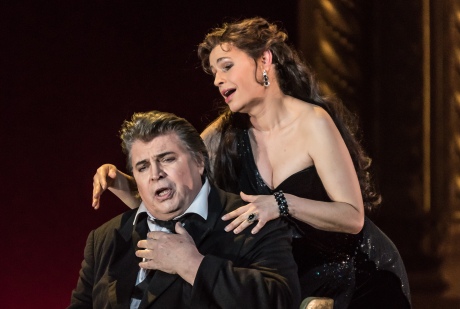
Even so, there’s yet worse to report, for this was the single worst sung performance of any Wagner opera I’ve ever heard in this venue in my entire life, with one shining – nay, blazing – exception: the lone returnee to this low-rent farrago, Christian Gerhaher, whose singing is so perfectly focussed and projected, even at extremes of pianissimo, as to show the whole rest of the cast up something rotten (not that it would take singing of this transcendent excellence to do that, believe me). So, to particularise, the women are wholly miscast. Emma Bell’s voice is big and very blowsy, the tone full of throb and waffle, which makes a nonsense out of the virginal role of Elisabeth which should be properly incarnated by the vocally pure and silvery likes of Grümmer, Janowitz and Studer (or modern equivalent: how about Dorothea Röschmann?). I thought her Act II opening “Dich, teure Halle” was painful to have to listen to, just a lot of short-breathed blowsy yowling, and this in the very house where, less than two years ago, a singer called Lise Davidsen sang the most incandescent, effortlessly radiant account I’ve ever heard anywhere live and promptly won the Domingo Operalia Prize for so doing: why wasn’t she cast? In fact, Bell settled thereafter – or I to some extent resigned myself to her hard-edged huge sound which would surely be better suited to Sieglinde or indeed Isolde – and she tried very hard to sing “Allmächt’ger Jungfrau” softly, though with the pressure taken off the tone the pitch can vary, and there’s a disagreeably nervous sense of someone treading their way very gingerly across egg shells.
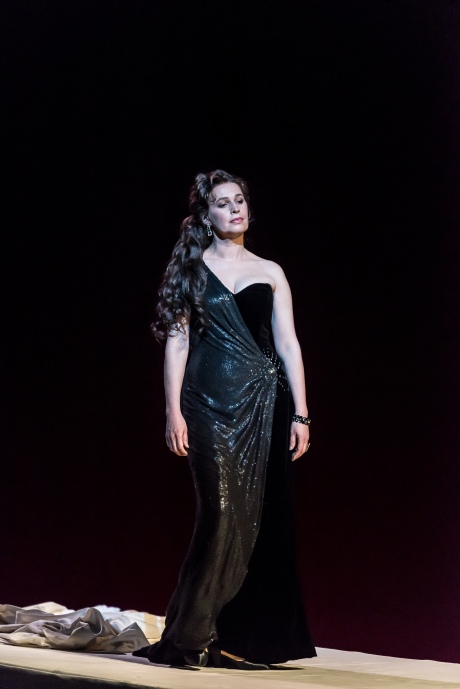
Equally miscast, as Venus, and singing in incomprehensible German to boot, was Sophie Koch, a singer of high intelligence and taste, but alas quite alarmingly worn and/or overparted, whose lowest range as heard here now takes the form of pitch-indeterminate juddery gargling, and who simply cannot either reach or sustain the heroic declamation at or above the stave (her curse on her former lover in Act I culminated a series of mountingly brief squeaks rather than fully sung notes, thereby killing the music-drama stone dead, as if the preceding gymnastic cavortings by twelve dancers in risibly abysmal choreography by Jasmin Vardimon hadn’t already left it teetering on life-support). She looks good, of course, and – like Emma Bell – can certainly act. But that’s no fit compensation for not being able to sing the damn thing as written. Finely sung Shepherd Boy – or whatever he’s meant to be in this staging; any amount of clanking cowbells offstage, nothing whatsoever on – from Raphael Janssens, though the role is no longer the focus of the “drama” as it was in 2010.
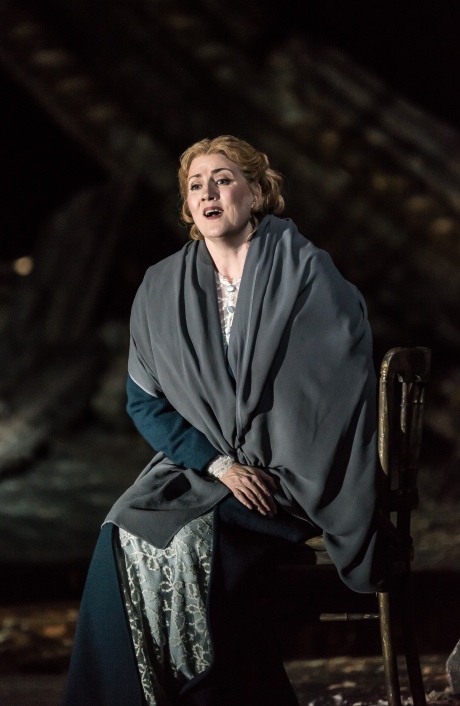
Stephen Milling, as Landgraf Hermann – here done up as some Balkan warlord – is starting to sound strained by the range of this role, the higher reaches of which are sung with notably thinner tone and markedly slower vibrato: Christof Fischesser last time out was far more preferable. The lower ranks of Minnesingers were, I thought, largely undistinguished, especially Michael Kraus’s almost pitch-free wooflings as Biterolf, though I exempt Ed Lyon’s Walther von der Vogelweide, stylishly and securely sung (if tonally not very ingratiating) and the only singer on stage all night long – the honourable Gerhaher apart – who actually managed to sing accurate grupetti, that rapid little four-note “turn” figure that twines itself between two adjacent notes and which are strewn all over this score in every singer’s part like confetti, and which no-one else could even begin to sing properly tonight, either emerging as a smeary yowl (Bell) or a gargled fluster (Koch).
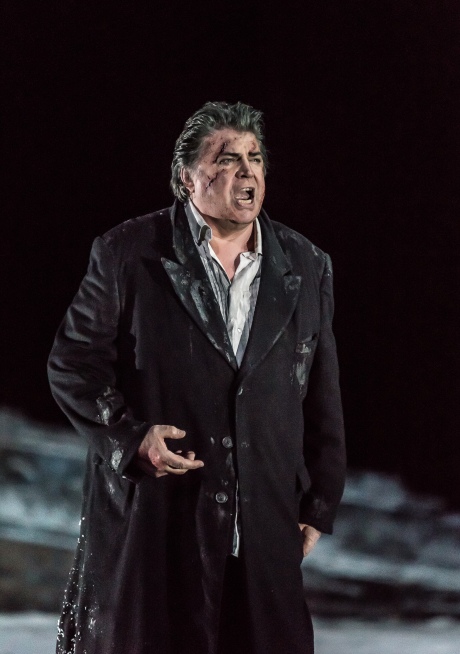
O well, there’s no avoiding, as much as I postpone the horror, of giving some account of Peter Seiffert’s travails in the title role. I heard him sing it almost exactly thirteen years ago, here, at the Royal Festival Hall, in a quite wonderful concert performance given by the forces of Zurich Opera conducted by Franz Welser-Möst, and if he wasn’t exactly ideal – too pinched at the top and rather prone to croon – he was certainly as good as any I’d ever heard live and better than most (though even then he was upstaged by his Wolfram, Thomas Hampson). He was then 49, probably about the right age at which to tackle this most thanklessly demanding of any of Wagner’s heroes (notable how so many of the very best tenors never go anywhere near it, including Vickers and Kaufmann). Simple mathematics will therefore tell you that Seiffert is now 62, and it would be idle to pretend that in any meaningful sense he can still sing the role as it needs to be sung. The tone has spread so far that it would be more accurate to speak of a “flap” rather than anything so mere as a “wobble”; the breath-line has shrunk alarmingly, involving all sorts of crafty voice-management (mind you, so has Koch’s, and she isn’t 62 or anywhere near it, and hasn’t been singing this punishing repertory all her life). The timbre remains the same – quintessentially Germanic nasal, never all that pleasant to hear, even in proper working order – but the sheer effort involved in cranking out the cruel tessitura is everywhere audible now, alas, and is liberally peppered by all manner of minor croaks and squawks, culminating in a Rom Erzählung (supposedly Act III and the role’s crowning glory) that was nigh-on painful to have to sit through, the voice progressively giving way under the piece’s unforgiving onslaught, to the point that I never thought he’d actually make it to the end (though he did, just) sounding as if he was gargling with gravel. I do not for an instant think he’ll sing, or be able to sing, all of the six remaining performances: and if he – or the bizarrely-run casting department at the ROH that thought it was a good idea to have him sing it in the first place – had any sense, he wouldn’t sing any of them at all. But then, I suppose they’re too preoccupied right now with trying to persuade Emma Kirkby to sing Norma.
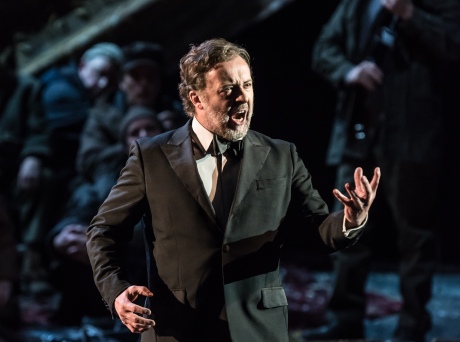
If Bychkov in 2010 presided over an exercise in somnolence – just as he did two years ago here in Die Frau ohne Schatten, to similarly debilitating dramatic effect – Hartmut Haenchen pursues the opposite path in this revival, setting some cracking tempi throughout and, as I observed above, knocking off over 25 minutes from the self-same edition of the score. But I can’t say I like this any better. Welser-Möst was similarly brisk, but exercised tremendous grip and overall architectural control, whilst securing truly superlative ensemble playing and choral singing from the Zurichers. Haenchen in stark contrast presides over an account of the score I would describe as fundamentally incoherent, all fits and starts, with dead patches and poor ensemble – some woeful scrambles between pit and stage – and absolutely no sense of the score’s sheer sonic grandeur or cumulative build. The closing chorus was almost comically bathetic, no glow, no growth, just a series of jaunty little chords and you can all go home now, which was even worse to hear than the perky jog-trot which accompanied the entry of the song contest audience in Act II, reduced to a cartoonish gabble (though the staging at this point is so far from admitting of anything quite so formal as an “entrance”, the ragged gun-toting freedom fighters crawling on like rats into a bombed-out building, that the sheer bounce might be thought as appropriate to the rubbishy mise-en-scène). Decent (much enlarged) choral singing, though I’ve heard both it, and them, on far finer form.
Frankly, nothing about this wretched revival merits your attention, except of course for Gerhaher, though even his elevated presence doesn’t – indeed, cannot – compensate for the rest (as, much to my surprise, row upon row of empty seats rather tended to confirm). My advice would be to keep an eye on the ROH’s website, for news about casting developments, and sniff around for deals, which on this pretty shameful showing, might well be forthcoming.
5 stars for Christian Gerhaher
1 star for everything else
Stephen Jay-Taylor © 2016
(Photos : Clive Barda)
You really went for it that time Stephen.
Too much sugar coating for my tastes 😀 I saw the rehearsal which was also bit rough and ready.
Peter Seiffert was far too old for the part and my expectations were lower by quite some margin ! I believe I did also see the RFH Zurich performance – on that occasion I though he was quite good. But as you say 13 years ago !!!
Glad I am not the only one who misses the Act 1 staging – It has been to Chicago so I am guessing it was re-staged for that – and what we got was this modified effort.
I was also at the dress rehearsal on Saturday and it was painfully clear to everyone in the house that Seiffert was in serious vocal difficulty, especially by the Rome Narration where it seemed he might not actually make it to the end. It’s a mystery why the ROH cast him…. a shame they didn’t employ Andreas Schager who was excellent and totally indefatigable in the role with the Vlaamse Opera last year. I wouldn’t be surprised if Seiffert’s cover (Neal Cooper, I believe) ends up doing several shows….